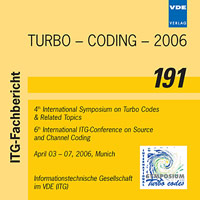Unequal Energy Allocation with Turbo Codes for Nonuniform Sources
Conference: TURBO - CODING - 2006 - 4th International Symposium on Turbo Codes & Related Topics; 6th International ITG-Conference on Source and Channel Coding
04/03/2006 - 04/07/2006 at Munich, Germany
Proceedings: TURBO - CODING - 2006
Pages: 6Language: englishTyp: PDF
Personal VDE Members are entitled to a 10% discount on this title
Authors:
Shamir, Gil I. (ECE Dept., University of Utah, Salt Lake City, UT 84112, USA)
Souza, Richard Demo (CPGEI, CEFET/PR, Curitiba, PR, Brazil)
Garcia-Frias, Javier (ECE Dept., University of Delaware, Newark, DE 19716, USA)
Abstract:
Non-systematic channel codes can have a significant advantage over systematic codes when utilizing redundancy left in the data for channel decoding. However, results previously attained show that even with such codes there is a performance gap to the theoretical limits. We study techniques that allow reducing this gap by using unequal energy allocation for both systematic and non-systematic turbo codes. For both types of codes, there are regions of source non-uniformity, for which they outperform codes with equal energy allocation. Systematic codes with unequal allocation perform well at extreme non-uniformities. The non-systematic codes perform well at moderate non-uniformities and still outperform their equal energy allocation counterparts at extreme non-uniformities. A theoretical study of the mutual information attainable by the different classes of codes for different source non-uniformities is presented, and supports the advantage of non-systematic codes with unequal allocation over the other classes of codes. While it also points out that the non-systematic codes should be better for extreme source non-uniformities, simulation results show that the current designs of the systematic codes with unequal energy allocation are still better than those of the non-systematic codes in this region.


